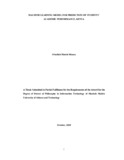| dc.contributor.author | Musau, Obadiah Matolo | |
| dc.date.accessioned | 2020-11-04T09:48:40Z | |
| dc.date.available | 2020-11-04T09:48:40Z | |
| dc.date.issued | 2020-10-05 | |
| dc.identifier.uri | http://r-library.mmust.ac.ke/123456789/1413 | |
| dc.description.abstract | Prediction of students’ academic performance with high accuracy is useful in many ways in academic institutions. Institutions would like to know which students are likely to have low academic achievements or need assistance in order to finish their studies. Successful students’ academic performance prediction at an early stage in learning depends on many factors. Machine learning techniques can be utilized to predict students’ future academic performance. The primary objective of this study was to develop a machine learning model for prediction of students’ academic performance. To achieve this objective, the study was guided by the following theoretical and empirical objectives: 1. To analyse existing studies on students’ academic performance prediction, 2. To find out the most significant factors that affect students’ academic performance, 3. To develop a model for students’ academic performance prediction in Kenya and, 4. To validate the students’ academic performance prediction model. Student data was collected from 1720 former secondary school students currently enrolled in tertiary institutions using questionnaires. The data included students’ academic performance, demographic features, social features and school related features. Naïve Bayes, Decision Trees and Neural Networks were used to predict students’ final examination grade. The performance of the prediction models was validated using 10-fold cross-validation method. J48 Decision Tree prediction model achieved 85.9 % prediction accuracy, Naïve Bayes prediction model achieved 78.96% prediction accuracy and Neural Networks Multi Perceptron prediction model achieved the lowest prediction accuracy of 73.73%. This work will help educational institutions, school managements, government ministries, parents, donors and other education stakeholders to predict students’ performance and identify nonperforming student that need assistance to finish their studies. | en_US |
| dc.description.sponsorship | MMUST | en_US |
| dc.language.iso | en | en_US |
| dc.publisher | MMUST | en_US |
| dc.subject | Machine, Learning, Model, Prediction, Students, Academic, Performance. | en_US |
| dc.title | MACHINE LEARNING MODEL FOR PREDICTION OF STUDENTS’ ACADEMIC PERFORMANCE, KENYA | en_US |
| dc.type | Thesis | en_US |

